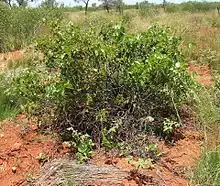Ipomoea costata
Ipomoea costata, commonly known as rock morning glory, is an Australian native plant. It is found in northern Australia, from Western Australia, through the Northern Territory, to Queensland.
| Bush potato | |
|---|---|
 | |
| Scientific classification | |
| Kingdom: | Plantae |
| Clade: | Tracheophytes |
| Clade: | Angiosperms |
| Clade: | Eudicots |
| Clade: | Asterids |
| Order: | Solanales |
| Family: | Convolvulaceae |
| Genus: | Ipomoea |
| Species: | I. costata |
| Binomial name | |
| Ipomoea costata F.Muell. ex Benth. | |
It is the source of bush potato, a bush tucker food for Aboriginal people. Bush potatoes are cooked in the hot earth beside the fire, and potato is still eaten in the desert today.
It is a fast-growing creeper with large purplish-pink trumpet flowers.
Aboriginal names
In Central Australia, I. costata is also known to Aboriginal people by the following names:[1]
- Alyawarr: anaty
- Anmatyerr: anaty or anek
- Eastern Arrernte: anatye
- Western Arrernte: natye
- Pintupi: ala or yala
- Warlpiri: karnti or paparda
References
- Vincent, Ange (July 2009). "Australian Bush Foods Information Sheet 6: Bush Potato Ipomoea costata & I polpha" (PDF). Desert Knowledge CRC. Retrieved 18 March 2020.
This article is issued from Wikipedia. The text is licensed under Creative Commons - Attribution - Sharealike. Additional terms may apply for the media files.